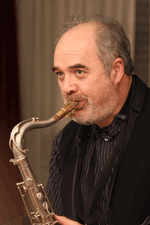> [Archived] Interviews

Launching Event at the Radio Hall - 'Jancsy Körössy Solo Piano'; Interview with Nicolas Simion
An interview with saxophonist and composer Nicolas Simion offers more information.
The concert at the Radio Hall begins with one of your compositions, a poem dedicated to Jancsy Körössy. What could you tell us about this work and the one it is dedicated to?
For those who knew Jancsy Körössy in the 50s and 60s, I don't need to say much; for the young audience and for the jazz lovers of the past few decades, I could say he is the greatest Romanian jazz musician, he is an exceptional pianist, a very talented composer and arranger who, unfortunately, lived in the United States for 30 years. He returned to Romania in 2001, when I invited him to go on tour in Germany, Austria and Romania and he stayed in Europe and in Romania. He died in January, 2013 and we have prepared a CD with the music he recorded in 1972 and 1975 in Atlanta - which we will release during the concert intermission - called American Impressions and Romanian Landscapes, which portrays this great musician and friend of mine. I am glad we can present it to the Bucharest audience.
How did you find these recordings that are now available on CD for the first time?
These are unique recordings, they were recorded on magnetophon in the 70s, then they were transferred to cassette tapes, to the CD and remastered. They are live recordings from a concert hall in a university in Atlanta and in a jazz club. Jancsy is a sort of George Enescu of the Romanian jazz, for those who listened to him during concert. He started working with folklore in the 50s, to mix American and Romanian jazz, folklore and pop music, he had an absolute pitch, have a memory like an elephant… he was performing some of the works he had written in the 50s. He influenced the entire jazz scene in Romania, if we can speak of a real jazz scene here, with Johnny Rãducanu, Marius Popp, Dan Mândrilã, Aura Urziceanu and all the other ones we know. All of them learned from him and all of them performed with him.
What does Jancsy Körössy mean to you?
He was a legend for me. As he left in '68, I heard about him from Mr Mândrilã, Mr Berindei, Johnny Rãducanu and Marius Popp - all of whom had known him and had played with him. Incidentally, when I left Romania in 1988, I met him in Budapest, in December, 1988, and we had a short conversation. Of course, he hadn't heard of me, I was still a novice. After a my tour in Japan, in 2001, I found one of his LPs in a jazz record store - that only sold jazz records - which cost 1,000 dollars. Then, I realised that he was much more appreciated and well-known abroad, in fact, in Japan, than in Romania, and this is how I contacted him. We exchanged letters, e-mails, faxes, and finally I convinced him to return to Europe and to start collaborating with me.
What does this work that you dedicate to him include?
Jancsy was born in Cluj, he is of Hungarian origins, but he loved Romania and he was more of a patriot than many others who only speak of it. He really loved the Romanian people, music and culture. I tried to portray him somewhow, starting with the place where he was born. Then, I tried to process a ballad that I called Miorişa, but it isn't the one we know, which has over a thousand variations; it's just that I wanted to convey the idea of folklore. Then, I dedicated a lullaby to him, there is also an interlude called 'Janscy's Sorrow', because he was very impulsive, very determined, and he wouldn't make compromises. Then, there is a slow part when I play 'Missing Home' on the taragot, and the ending is 'The Dance of the Szeklers.' I hope you'll like it. During the concert intermission break we'll present this double CD with Janscy's music, which deserves to be heard and known by any music lover in Bucharest and Romania.
Translated by Irina Borşoi and Elena Daniela Radu
MTTLC, Bucharest University














